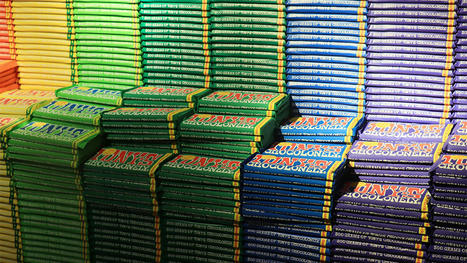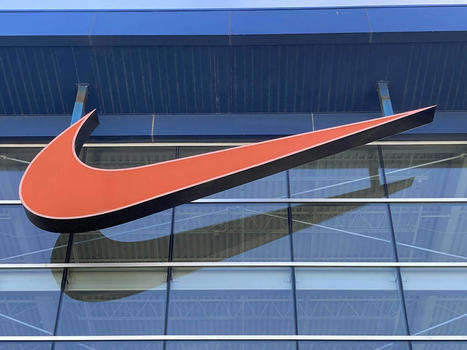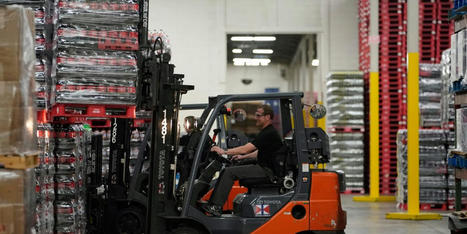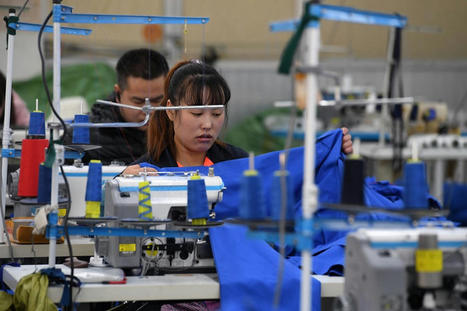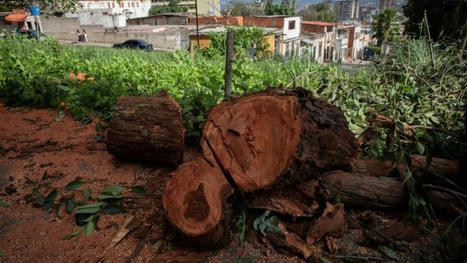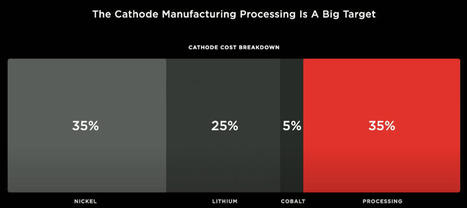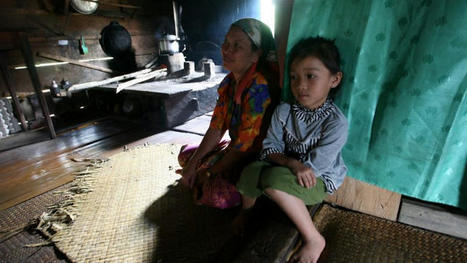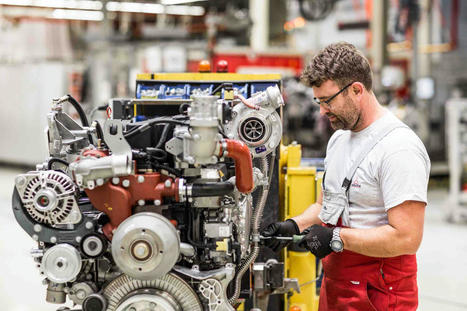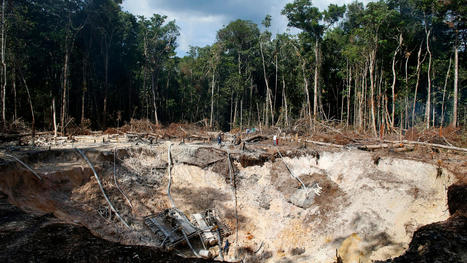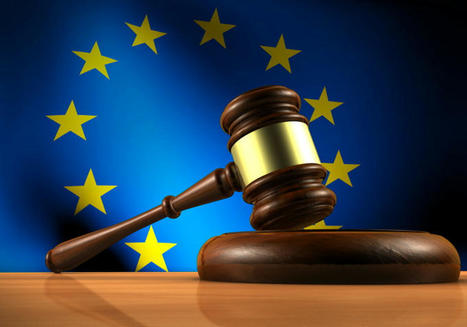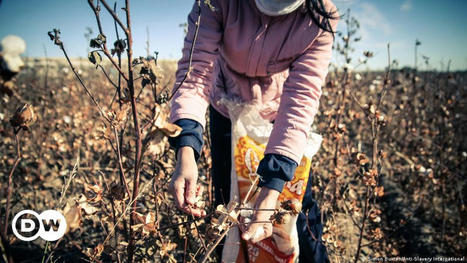 Your new post is loading...
 Your new post is loading...
Supply chains in commodity industries are often characterized by social and environmental abuse. In the cocoa industry, for example, the average farmer cultivates between three and five hectares to earn less than two dollars a day. It is an environment rife with social and environmental abuse. In this article, the authors look at the experience of Tony’s Chocolonely, a Dutch chocolate brand founded in 2005, which set itself a mission to sell 100% slavery-free chocolate. They show how Tony’s brought its supply chain partners together to create an altogether new paradigm in which all actors take responsibility for social impact. And it really works: Tony’s profitably sells around $130 million worth of slavery-free chocolate bars in Western Europe and the U.S.
Via EcoVadis
A Nike shareholder is asking the company to take stronger action to protect human rights for its garment workers.
Tulipshare, which currently owns 276 Nike shares, filed a shareholder proposal that asks Nike’s board to assess and rethink how its supply chain upholds the company’s committments to human rights.
The proposal requests a report from Nike that details if the company’s supply chain upholds these values — and asks Nike to use specific metrics to track perfomance on forced labor and wage theft. Tulipshare also asked Nike to consider using a model contract clause from the American Bar Association (ABA) that protects human rights for workers in the supply chain.
“We are asking Nike to implement these clauses into all of its supply chain contracts, which will not only make human rights policies into ‘operational commitments’ but also continue to allow Nike to be leaders in supply chain innovation moving forward,” read an explanation of the proposal.
Tulipshare said that Nike acknowledged the receipt of the proposal, which was submitted on Thursday. FN has reached out to Nike for a comment.
According to Tulipshare CEO and founder, Antoine Argouges said Nike’s current reporting methods, including its annual Impact Report, do not adequately analyze how it addresses potentially using Uyghur forced labor in its supply chains.
Via EcoVadis
New Japanese government guidelines on business and human rights mean that Japan’s car industry should accelerate efforts to clean up their supply chains. Japan’s carmakers are gradually embracing the transition to electric vehicles, which could help shrink the country’s destructive climate footprint. Although Japan gets more than two-thirds of its electricity from fossil fuels, electric cars still have a smaller carbon footprint than gas vehicles. When it comes to human rights, however, electric vehicles are problematic. The materials needed for car batteries and other parts are linked to global human rights and environmental harms. Japan’s three largest carmakers – Toyota, Nissan, and Honda – all scored poorly in the 2020 Corporate Human Rights Benchmark, which ranks companies on their global human rights performance. Japan’s new business and human rights guidelines, released September 13, are nonbinding and need significant improvement, but make clear that Japanese companies should identify human rights abuses in their supply chain and work with their suppliers to fix them.
Via EcoVadis
From protecting human rights to acting ethically to promoting decent working conditions, companies worldwide are failing to live up to their promises to be socially responsible.
Pressure from shareholders and the public just isn’t enough to force companies to uphold their pledges to protect human rights, according to a World Benchmarking Alliance study of 1,000 companies across more than 60 countries. Only 10 of those companies have achieved the fundamental expectations of the United Nations’ Sustainable Development Goals, according to the WBA. That’s a failure rate of 99% for these powerful companies, which the WBA estimates generate about 25% of the world’s gross domestic product and employ more than 56.5 million people.
Via EcoVadis
The Sustainable Apparel Coalition (SAC), a nonprofit alliance promoting sustainable practices for the consumer goods industry, has entered into a partnership with the Initiative for Global Solidarity (IGS) to coordinate a project advancing environmental, social and labor assessment methodologies in the garment and footwear sector. The initiative is being launched in collaboration with the Apparel…
Via EcoVadis
The European Commission is considering sanctions to tackle environmental damage and human rights abuses in Europe’s supply chains, according to Nils Behrndt, acting deputy director-general at the executive’s justice department.
“We are looking into the question of the sanctions, the penalties, because obviously, if you don’t have effective enforcement, then you will not create the necessary pressure,” said Behrndt at an event organised by the NGO Global Witness.
Via EcoVadis
Last month, Tesla released its Conflict Mineral Report for the fiscal year ending on December 31, 2019, and emphasized the importance of sourcing only responsibly produced materials. “This means having safe and humane working conditions in our supply chain and ensuring that workers are treated with respect and dignity,” the company said in its SEC filing.
Via EcoVadis
A UK investor coalition that presses companies to unearth modern-day slavery in their supply chains said on Monday it was going to expand its campaign into the construction and materials sectors.
The ‘Find It, Fix It, Prevent It’ initiative – founded in 2019 by CCLA Investment Management – has focused up to now on the hospitality industry.
“The construction industry is estimated to contain 18% of the world’s victims of forced labour,” CCLA’s chief executive, Peter Hugh Smith, said.
Via EcoVadis
President Ursula von der Leyen pledged to have “zero tolerance” for child labour in EU trade, and asserted a vision and priorities to have an EU that stands up for justice and human rights. She stressed that the EU economy must prioritize “social fairness and prosperity” for all people. While these are ambitious, promising steps, such aspirations are useless unless effective action is taken.
Sadly, child labour continues to increase in the EU supply chain of coffee, cocoa, and many other agricultural products. Child labour negates social fairness, equality, and justice, and weakens and threatens the rule of law.
Via EcoVadis
|
The construction industry, like other industries with complex and international supply chains, is vulnerable to the risks of modern slavery. Around the world, millions of people are affected by modern slavery, with victims subjected to forced labour, human trafficking, and other forms of exploitation.
In recent years, the UK has put forward measures to address this issue, including the Modern Slavery Act 2015. However, findings show that efforts to combat modern slavery in the country are waning. Those of us with ties to the construction industry are clear on the urgent need for renewed focus and commitment to this critical issue.
The Current State of Modern Slavery in the UK
An analysis by the Chartered Institute of Procurement and Supply (CIPS) reveals that only 29% of organisations required to produce a modern slavery statement submitted it to the UK government registry in 2022. This is a 46% drop in submitted statements compared to the previous year. Despite the risks of modern slavery abuses in the UK, not enough companies are adequately disclosing anti-slavery measures within their supply chains.
Via EcoVadis
Deutz has adopted a groupwide human rights code. It documents the drive specialist’s zero-tolerance strategy toward the abuse of universal, inalienable, and indivisible human rights.
“We take our responsibility for future generations and the environment very seriously. This also means ensuring that human rights are upheld without exception and at all times. The ongoing war in Ukraine, in particular, has shown that we cannot take this for granted,” says Deutz CEO Sebastian C. Schulte. To underline the importance of this topic, Deutz has summarized the human rights principles that are most relevant in its human rights code. It is based on national and internal laws, on conventions and declarations such as the UN Guiding Principles on Business and Human Rights, on the fundamental conventions of the International Labour Organization, and on the United Nations Global Compact. “We view compliance with our human rights code as an essential part of our internal and external interactions. That applies equally to our employees and to our business partners,” Schulte adds.
Via EcoVadis
Last week, a special rapporteur investigating the use of mercury in small-scale gold mining and a UN fact-finding mission on Venezuela presented separate reports to the council on the impact of gold mining on many communities and the environment, particularly in the Amazon basin.
UN investigators cited human rights abuses such as sexual exploitation of women and children, mercury poisoning and child labour affecting communities where illegal gold production occurs, and pointed the finger at the responsibility of countries buying the metal.
The reports said global buyers such as Switzerland – through which roughly two-thirds of global trade transits – need to ensure that human rights are respected throughout supply chains.
Via EcoVadis
The European Commission has unveiled its proposals to introduce mandatory due diligence legislation which would make companies responsible for human rights and environmental issues in their global supply chains.
The law would initially apply to larger companies within the European Union (EU) with more than 500 employees and a global net turnover of more than €150 million (US$169m), and those based outside the EU but which generate the same turnover threshold within the single market.
After two years, it would be extended to smaller companies - with at least 250 employees and a turnover of €40 million (US$45m) - in "high impact sectors" including textiles, as well as agriculture and mining.
Via EcoVadis
It seems human rights abuses aren’t the only labor issues companies need to watch out for in their supply chains. Here, Thailand-based Theppadungporn Coconut Company details how it partnered to create the first audit scheme specifically designed to uncover monkey labor. Theppadungporn Coconut Company (TCC) — a third-generation, family-owned company that, over the past half-century, has grown into one of Thailand’s leading exporters of popular coconut products including coconut milk, coconut water and more to the United States and dozens of other countries — was confident that its suppliers weren’t using monkey labor. As it turned out, just stating that was not enough — the company had to be able to prove it.
“When we were accused of using monkey labor, we realized that we have to be more transparent — to ensure and show that there is no monkey labor in our supply chain,” Teetiphun Theppadungporn, International Marketing and Sales Manager at TCC, told Sustainable Brands™. He’s referring to a 2019 investigation from PETA Asia, which alleged that one farm producing coconut milk for TCC’s Chaokoh brand was using monkey labor.
Via EcoVadis
Business and human rights experts argue that Switzerland should seize the opportunity to require responsible sourcing of cobalt, an in-demand mineral whose risks to human rights are often overlooked.
Via EcoVadis
The law will require German companies to report human rights or environmental abuses by suppliers. Supporters say it is a milestone, rights groups say it falls short.
Via EcoVadis
The European Commission (EC) has adopted a Chemicals Strategy for Sustainability to further strengthen protection of human and environmental health, including a phase out of the most harmful substances and simplification of the risk assessment process.
Via EcoVadis
|



 Your new post is loading...
Your new post is loading...

